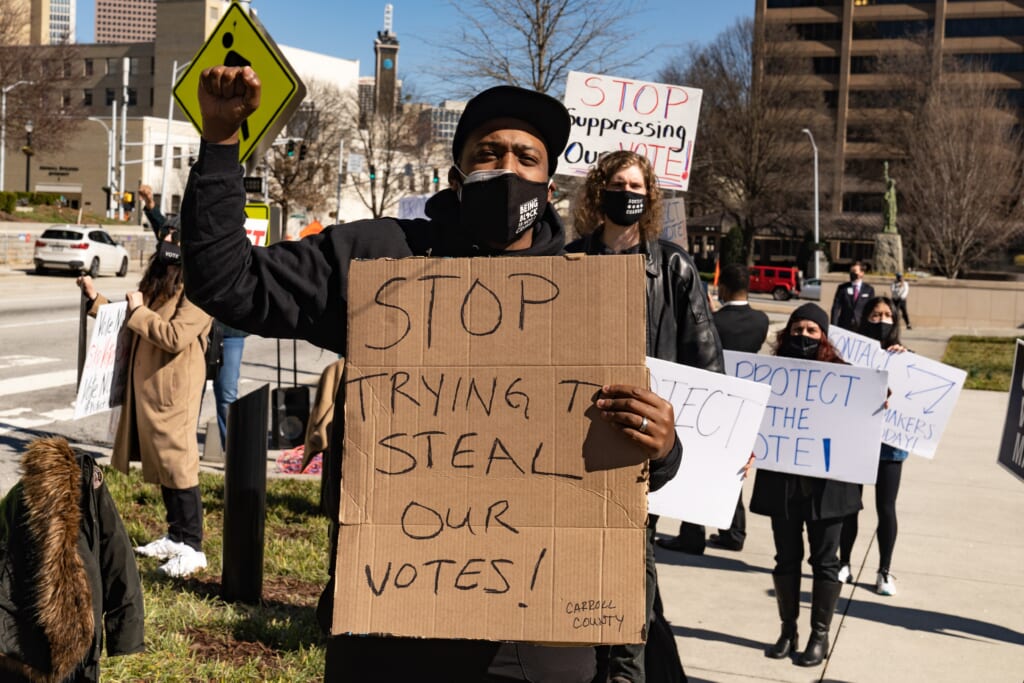Group says 34 laws have been enacted to restrict voter access
With election day near, efforts to curtail coting gain more scrutiny
2020 heralded the beginning of various changes for voters across America, from limitations brought on by the COVID-19 pandemic to laws and restrictions governing voter access. In 2021, 19 states passed legislation to make it more difficult for citizens to cast their vote, whether in person or via absentee ballot.
According to a recent count by the Brennan Center, a New York-based law and policy nonprofit, 34 laws were enacted in the 19 states – Texas, Georgia, Florida, Alabama, Arizona, Oklahoma, Indiana, Kentucky, New York, Wyoming, Iowa, Louisiana, Arkansas, Kansas, Nebraska, Nevada, Utah, Idaho and Montana. Republicans lead the majority of these states.
Despite the efforts to curtail voter access, or perhaps because of them, many citizens remain determined to fulfill their civic duty and cast a ballot.
One such person is Jolie Haile, 18, an Atlanta native who voted early via absentee ballot. She attends Brown University in Rhode Island and heeded Georgia’s rules for early voting because, she said, she wants to participate in American democracy.
Haile said she wants to elect representatives who will work to make Georgia a more welcoming and inclusive state as well as those who will thoroughly investigate the state’s contentious past and address systemic issues — especially after the 2020 election.
“I believe having different ideologies is great. However we have to draw a line where human rights and discrimination is involved, so I wanted to take advantage of the opportunity to vote for people that represent my ideals,” she added. “In light of the Roe v. Wade decision [and] as a young woman, I feel that it is very important to vote in this election to make sure women, instead of men, are making the decisions about what happens to women, a decision which should be personal and not restricted by the government.”
The following is a synopsis of voting rules in those 19 states, as well as links for additional information.
- Alabama
In Alabama, mail-in absentee ballots must arrive at the office of the county’s polling centers no later than seven days before the election. Applications that have been returned by hand must reach the office of the county’s absentee election manager by the same time frame.
The absentee election manager must receive a returned absentee ballot by mail no later than noon on election day. Hand-delivered ballots must be in the absentee election manager’s office by the end of business on the day before the election (but no later than 5 p.m.).
For more information, check the Alabama Secretary of State website.
- Arizona
Any registered voter is allowed to request and submit a mail-in absentee ballot. For more information, check the Arizona Secretary of State website.
- Arkansas
Voters who will be unable to cast their ballots in person can request absentee ballots via mail. All others are expected to cast their ballots in person. Provisional ballots are available to voters without identification on Election Day, and a valid form of identification must be submitted by noon the following Monday to verify it. For more information, check the Arkansas Secretary of State website.
- Florida
Voters can vote by mail, via early voting, or on Election Day. A ballot sent by mail cannot be transmitted to an address different from the one specified on the ballot. Vote-by-mail requests for subsequent elections must be renewed if a ballot is returned as undeliverable.
Requests for a vote-by-mail ballot must be made no later than 5 p.m. on the 10th day before the election. For more information, check the Florida Secretary of State website.
- Georgia

You must submit an application for an absentee ballot (in person, over the phone, via fax, mail or online). Requests can be made between 78 and 11 days before election day. For more information, check the Georgia Secretary of State website.
- Idaho
Any voter is permitted to mail in an absentee request and ballot. In order to use the online absentee ballot request system, voters must provide a valid Idaho driver’s license number and their Social Security number’s last four digits. For more information, check the Idaho Secretary of State website.
- Indiana
Counties must allow in-person absentee voting for a period of 28 days prior to the election, ending at noon local time on the day of the election. Additionally, on the two Saturdays leading up to the election, all counties must allow in-person absentee voting.
In order to cast an absentee ballot by mail, voters must be able to mark their own ballot by hand, sign their name on the completed ballot security envelope and have one of the state’s qualifying reasons.
For more information, check the Indiana Secretary of State website.
- Iowa
Voters may vote via absentee ballot. The county auditor’s office must receive an absentee ballot request by 5 p.m. no later than 15 days before the election. For more information, check the Iowa Secretary of State website.
- Kansas
Any voter may request a mail-in ballot in Kansas. Residents can also cast ballots in advance in person. Voters must seek an absentee ballot by Nov. 1 and return it in person or have it postmarked by Nov. 8. For more information, check the Kansas Secretary of State website.
- Kentucky
Kentucky voters may request an absentee ballot by mail. The state allows early absentee voting in person on specific days. For more information, check the Kentucky Secretary of State website.
- Louisiana
Voters must have a legitimate reason to cast an absentee ballot, unless they are in the military or are abroad. They may print out an application and mail it to their local registrar of voters, or submit an absentee ballot request through the state’s online system. Louisiana does allow early voting. For more information, check the Louisiana Secretary of State website.
- Nebraska
Any eligible voter may request an absentee ballot and vote by mail. The ballot must be requested by 6 p.m on Oct. 28 and delivered to the proper election office by 8 p.m. on Nov. 8. For more information, check the Nebraska Secretary of State website.
- New York

To cast an absentee ballot in New York, voters must be out of their county or, for New York City residents, absent from the five boroughs on Election Day. Voters may also qualify for an absentee ballot based on other criteria that can be found on the New York Board of Elections website.
- Montana
Absentee votes are available to all registered voters, and they are mailed 25 days before the election. The person to whom the ballot was issued must sign an affirmation on the return envelope before mailing it back or delivering it. On Election Day, absentee ballots must be received at the election office or voting location by 8 p.m. local time. For more information, consult the Montana Secretary of State website.
- Nevada
All registered voters in Nevada automatically receive a ballot by mail. Ballots must be received by 7 p.m. on Election Day (if delivered personally) or have a postmark from that day to be counted.
- Oklahoma
Any registered voter may cast a ballot in person or by mail. The Oklahoma State Board of Elections has more information about voting procedures on its website.
- Texas
To cast an absentee ballot, you must be 65 years old, disabled or outside the county.
The deadline for requesting an absentee ballot is Oct. 28. Ballots must be postmarked by 7 p.m. on Nov. 8. For more information, consult the Texas Secretary of State website.
- Utah
The state will begin mailing ballots to active registered voters on Oct. 18. The ballot must be returned by mail and postmarked before Nov. 7. If returning a ballot in person, it must be received by 8 p.m. Nov. 8. Utah has more information on the state’s website.
- Wyoming
Any voter may request an absentee ballot, and it must be returned by 7 p.m. on Nov. 8. When voting in person, voters must show identification. The Wyoming Secretary of State website contains more information for voters.
TheGrio is FREE on your TV via Apple TV, Amazon Fire, Roku and Android TV. Also, please download theGrio mobile apps today!


